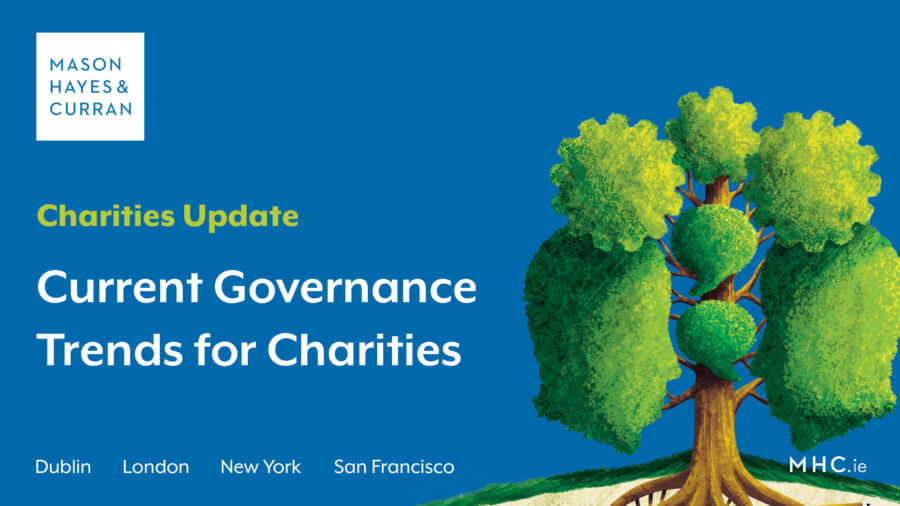
2021 was a busy year of governance for charities, as they reported, for the first time, on their compliance with the Charities Governance Code. So far this year, we are assisting many charities in their compliance with the Governance Code and to address governance issues generally. In this Insight, we summarise the most common governance matters that we are currently assisting charities with. Charities will see a lot of detail appearing in the press and elsewhere relating to the General Scheme of the draft Charities (Amendment) Bill 2022, which was published on 29 April 2022. We are making a submission to the Joint Committee on Social Protection, Community and Rural Development and the Islands with our comments on the draft Bill. We will keep you informed on the progress of the General Scheme and draft Bill, as there is a lot of detail in it that charities and charity trustees will have to be aware of.
Updating the charity’s declaration of compliance
A charity’s state of compliance with the Governance Code is not necessarily static. As a charity brings itself into compliance with additional standards of the Governance Code, it should update its declaration in relation to the Governance Code to reflect its current state of compliance.
This is not a step that can only be taken once a year, when submitting a charity’s annual report. Rather, it can be taken at any time, by logging onto the charity’s online account and completing the form titled “Maintain Charities Governance Code Status”.
The Charities Regulator has recommended that all charities ensure that any public statements they make about their Governance Code compliance match the declaration submitted by the charity to the Charities Regulator.
We recommend that charity trustees keep compliance with the Charities Governance Code, and governance generally, as a standing item on the agenda of their meetings and update compliance with the Governance Code as and when that occurs during the year.
Rotation and term limits
One of the standards within the Governance Code requires charities to “consider introducing term limits for your charity trustees, with a suggested maximum of nine years in total”. We are assisting many charities to consider and update the terms and rotation provisions set out within the charities’ governing documents.
Does your charity’s governing document specify a term limit or rotation provision? For example, the rotation provisions of many charitable companies require one third of the directors to step down at each AGM. Is your charity following the provisions of its governing document? If not, the charity risks breaching its governing document and potentially invalidating decisions of its charity trustees.
We have been working with many charities in recent months to update the provisions of their governing documents to ensure that they implement a practical, effective rotation and term limit regime. It is important that the provisions facilitate the attraction and retention of an engaged, effective, skilled team of charity trustees. If your charity has one or a number of charity trustees who have been in that position for in excess of the suggested maximum term of nine years that the Governance Code suggests introducing, a discussion should take place as to the reason and benefit of that. It should be considered whether or not, for instance, that charity trustee is involved in a project with an end date and their term will conclude at that time, or whether the individual has already given a great deal to the charity and it is now time to introduce new charity trustees with different skills and competencies that are currently needed.
Charity trustee disruption or disputes
The charity trustees of a charity are responsible for governing and managing the charity and ensuring the fulfilment of its charitable purpose. We advise charities which have one or more charity trustees on the board who can be disruptive to board proceedings or who are in dispute with one or more of the charity trustees.
This is a particularly difficult situation, particularly where all charity trustees are voluntarily giving their time and expertise to the charity.
We work with charities to guide them through the legal principles applying to such disruption or disputes and to assist them in resolving those issues so that the charity trustees can focus on delivering the charitable purpose of the charity.
Longer term decisions
We are also assisting charities that have considered the obligations arising under the Governance Code which may result in changes to a charity’s structure. For example, some charities are considering whether their legal structure is fit for purpose. Others are considering “the advantages and disadvantages of working in partnership with other charities. This standard in the Governance Code has led several charities to devise plans to merge, or work closely with, other charities to obtain efficiencies and carry out their charitable purposes more effectively.
Conclusion
Best practice governance is an ever-evolving concept. All charities should carefully consider their governance practices on an ongoing basis. Completion of the Governance Code declaration every year, in a charity’s annual report, will assist in bringing focus to governance issues. We assist many charities, on a daily basis, with their particular governance queries and concerns.
If we can be of any assistance to your charity on matters relating to governance, please contact a member of our Charities & Not-for-Profit team.
The content of this article is provided for information purposes only and does not constitute legal or other advice.




